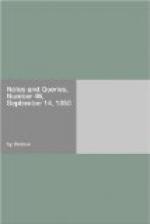“The Fusileer battalions (light infantry) were all armed with the new zuend-nadel guns, the advantages and superiority of which over the common percussion musket now admits of no contradiction, with the sole exception of the facility of loading being an inducement to fire somewhat too quick, when firing independently, as in battle, or when acting en tirailleur. The invincible pedantry and amour-propre of our armourers and inspectors of arms in England, their disinclination to adopt inventions not of English growth, and their slowness to avail themselves of new models until they are no longer new, will, undoubtedly, exercise the usual influence over giving this powerful weapon even a chance in England. It is scarcely necessary to point out the great advantages that these weapons, carrying, let us say, 800 yards with perfect accuracy, have over our muskets, of which the range does not exceed 150, and that very uncertain. Another great advantage of the zuend-nadel is, that rifles or light infantry can load with ease without effort when lying flat on the ground. The opponents of the zuend-nadel talk of over-rapid firing and the impossibility of carrying sufficient ammunition to supply the demands. This is certainly a drawback, but it is compensated by the immense advantage of being able to pour in a deadly fire when you yourself are out of range, or of continuing this fire so speedily as to destroy half your opponents before they can return a shot with a chance of taking effect.”
This was the first intimation I ever had of the zuend-nadel guns. I should like to know when and by whom they were invented, and their mechanism.
JARLTZBERG.
Bacon Family, Origin of the Name.—Among the able notes, or the not-able Queries of a recent Number, (I regret that I have it not at hand, for an exact quotation), a learned correspondent mentioned, en passant, that the word bacon had the obsolete signification of “dried wood.” As a patronymic, BACON has been not a little illustrious, in literature, science, and art; and it would be interesting to know whether the name has its origin in the crackling fagot or in the cured flitch. Can any of your genealogical correspondents help me to authority on the subject?
A modern motto of the Somersetshire Bacons has an ingenious rebus:
ProBa-conSCIENTIA;
the capitals, thus placed, giving it the double reading, Proba coniscientia, and Pro Bacon Scientia.
NOCAB.
Armorials.—Sable, a fesse or, in chief two fleurs de lis or, in base a hind courant argent. E.D.B. will feel grateful to any gentlemen who will kindly inform him of the name of the family to which the above coat belonged. They were quartered by Richard or Roger Barow, of Wynthorpe, in Lincolnshire (Harl. MS. 1552. 42 b), who died in 1505.
E.D.B.
Artephius, the Chemical Philosopher.—What is known of the chemical philosopher Artephius? He is mentioned in Jocker’s Dictionary, and by Roger Bacon (in the Opus Majus and elsewhere), {248} and a tract ascribed to him is printed in the Theatrum Chemicum.




